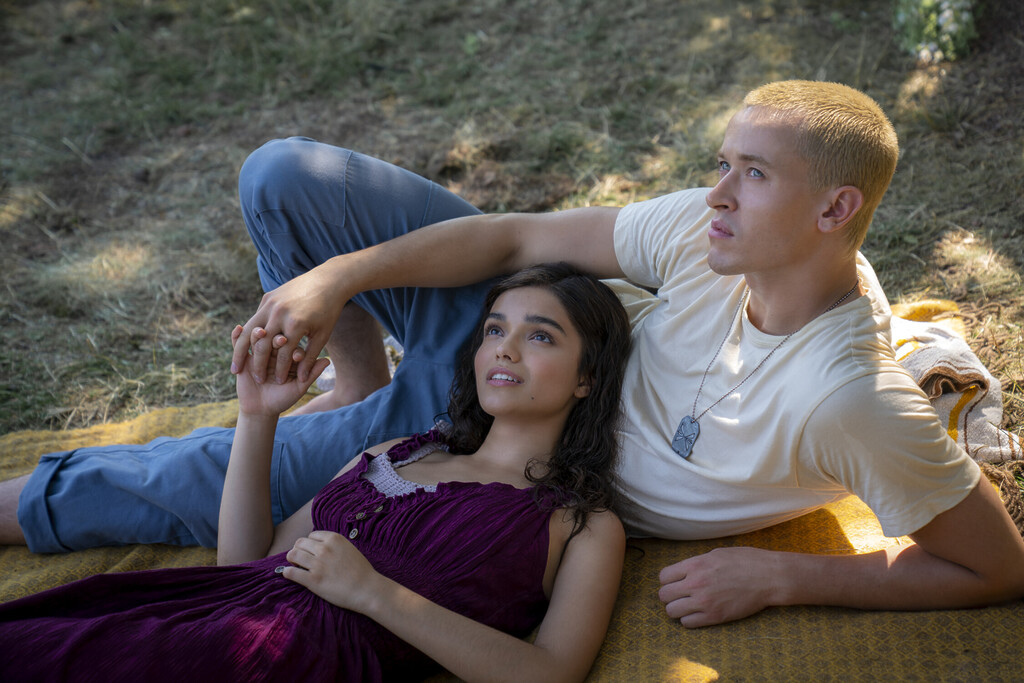“Snow lands on top.”
These were the words of young and power-hungry Coriolanus Snow (Tom Blyth), future president of Panem. Eight years after the adaptation of Susanne Collins novel Mockingjay: Part II was released, The Ballad of Songbirds and Snakes revisits the story of the Hunger Games, just ten years after they were first created. This is a Panem still reeling from the effects of the revolution, and the Hunger Games were only one of many gruesome reminders. In a new twist on the games, the Capitol’s brightest students were each assigned a tribute to mentor. Coriolanus Snow was paired with the spunky Lucy Gray Baird (Rachel Zegler) from District Twelve, and we get a glimpse into the backstory of the original trilogy’s main villain. However, The Ballad of Songbirds and Snakes is far from a vindication of Snow’s character; rather it reveals the pull of ambition, the choices leading to his descent, and the lengths people will go for power. Spoiler alerts ahead!
Similar to the novel, movie Snow is a dynamic and complex character, portrayed both as pompous and calculating yet loyal and clearly struggling with morality. The movie starts off with Snow’s childhood, with the specifically memorable incident of a cannibalistic neighbor during the rebellion. The Snows had lost their entire fortune during the destruction of District 13, and were barely hanging on to the Capitol lifestyle. This aspect of his character is introduced brilliantly after a time jump, showing Snow as a senior Academy student brushing off the fact that his make-shift shirt has buttons made of bathroom tile.
Tigris, an empathetic fashionista and creator of the aforementioned shirt, was one of the most supportive figures in Coriolanus’s life, and a strong character in her own right. Tigris was the first to dissuade him from arrogance and power, telling him that all she saw in his ambitious father’s eyes was hate. Coriolanus follows her guidance with Lucy Gray, treating her with the respect appropriate for a Capitol girl instead of someone from District 12. Tigris’s final words to Coriolanus reflected her previous ones, saying: “You look just like your father, Coriolanus Snow.” Remember, Tigris helped the rebels to kill Snow in the original trilogy (anyone else crying?).
Although many other characters were intriguing, I have to say I loved Lucy Gray the best, starting right from her introduction at the reaping. Her charm and bravado, along with Rachel Zegler’s stunning performance, made her one of the best characters in the film. Zegler’s subtle expressions skillfully showed the near-constant performance Lucy Gray put on, whether she was in the arena or on stage, while giving glimpses of the girl behind it.
The music was one of the most memorable parts, adding to a stirring atmosphere to the film with Rachel Zegler’s gorgeous, lilting voice. “Nothing You Can Take from Me” was absolutely riveting, with a folksy, apocalyptic vibe, while “The Hanging Tree” and “Pure as the Driven Snow” are haunting, bringing depth to the story and revealing so much about the characters. And of course, Olivia Rodrigo’s “Can’t Catch Me Now” was beautiful, and the perfect way to end the film. Go listen to the lyrics, they’re genius.
Furthermore, I absolutely adored the cinematography of the movie. The staging was picturesque, specifically with Lucy Gray’s timeless bow (reminiscent of Katniss’s), Reaper’s decision to tear down the Panem Flag, and Coriolanus’s desperate search for Lucy Gray. Watching that last scene in theaters was incredible, especially when the mockingjays repeated her song, and their voices reverberated throughout the theater. However, my favorite scene was when Coriolanus met Lucy Gray after Aracne had been killed. The actors did a phenomenal job revealing the emotion and humanity behind their character’s bravado, and the close-up shot that emphasized the bars separating the two also highlighted the comparisons between them. Though they were shaped by very different backgrounds, at that moment I was completely captured by their relationship.
It’s said that impossible loves make the best stories, and in The Ballad of Songbirds and Snakes, this couldn’t be more true. I loved Lucy Gray’s boldness, because from the moment they met, she had Coriolanus questioning everything. Her defiance at the reaping, paired with the clever performance she led him into at the zoo, was breathtaking, making him rethink many of his prejudices. As their relationship developed, they saved each other countless times; Lucy Gray saving face in the zoo, Coriolanus sneaking her food, and when Lucy Gray threw away her chance at escape to save him in the arena, he did everything he could to return the favor, even if it meant breaking the rules. Though I had read the book, I was still rooting for the characters, which made the ending that much more tragic.
I was very impressed with how closely the movie followed the book, with the timeframe it was given. The quotes were spot on, and the characters managed to match the persona I created for them when I read, which is not an easy feat. With countless pointers to the original trilogy, a phenomenal cast, and jaw-dropping scenes (did I forget to mention Lucy Gray’s final performance in the arena?), this movie is definitely worth watching.




































![Teacher Lore: Mr. Hillman [Podcast]](https://bsmknighterrant.org/wp-content/uploads/2025/03/teacherlorelogo-1200x685.png)




